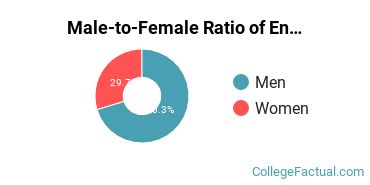 by our College Data Analytics Team
by our College Data Analytics TeamEngineering is a program of study at Villanova University. The school offers a bachelor’s degree in the area. Here, you’ll find out more about the major bachelor’s degree program in engineering, including such details as the number of graduates, diversity of students, and more.
You can jump to any section of this page using the links below:
In order to help students and their parents find the best school for them, we have created several different types of college rankings, which are updated yearly. Villanova was ranked #54 on College Factual's most recent list of the best schools for engineering majors. This puts the bachelor's program at the school solidly in the top 15% of all colleges and universities in the country. It is also ranked #8 in Pennsylvania.
Here are some of the other rankings for Villanova.
Part-time undergraduates at Villanova paid an average of $907 per credit hour in 2019-2020. This tuition was the same for both in-state and out-of-state students. The average full-time tuition and fees for undergraduates are shown in the table below.
| In State | Out of State | |
|---|---|---|
| Tuition | $56,730 | $56,730 |
| Fees | $730 | $730 |
| Books and Supplies | $1,100 | $1,100 |
| On Campus Room and Board | $14,975 | $14,975 |
| On Campus Other Expenses | $2,300 | $2,300 |
Learn more about Villanova tuition and fees.
Online degrees for the Villanova engineering bachelor’s degree program are not available at this time. To see if the school offers distance learning options in other areas, visit the Villanova Online Learning page.
Women made up around 32.8% of the engineering students who took home a bachelor’s degree in 2019-2020. This is higher than the nationwide number of 23.9%.

Around 18.7% of engineering bachelor’s degree recipients at Villanova in 2019-2020 were awarded to racial-ethnic minorities*. This is lower than the nationwide number of 31%.

| Race/Ethnicity | Number of Students |
|---|---|
| Asian | 11 |
| Black or African American | 11 |
| Hispanic or Latino | 17 |
| Native American or Alaska Native | 0 |
| Native Hawaiian or Pacific Islander | 0 |
| White | 189 |
| International Students | 4 |
| Other Races/Ethnicities | 9 |
Engineering students may decide to major in one of the following focus areas.
| Focus Area | Annual Graduates |
|---|---|
| Chemical Engineering | 59 |
| Civil Engineering | 51 |
| Computer Engineering | 32 |
| Electrical Engineering | 29 |
| Mechanical Engineering | 70 |
*The racial-ethnic minorities count is calculated by taking the total number of students and subtracting white students, international students, and students whose race/ethnicity was unknown. This number is then divided by the total number of students at the school to obtain the racial-ethnic minorities percentage.
More about our data sources and methodologies.